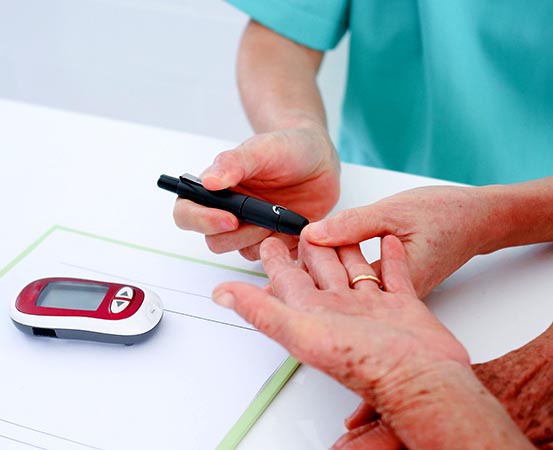 Diabetes and psoriasis are both chronic and prevalent conditions. So, the chances of them appearing in a person is quite high. But is it just a coincidence or is there more to it? Here’s what experts have to say.
Diabetes and psoriasis are both chronic and prevalent conditions. So, the chances of them appearing in a person is quite high. But is it just a coincidence or is there more to it? Here’s what experts have to say.
Psoriasis is a condition where inflammation causes skin cells to multiply faster than normal. Dr Sanjib Chowdhuri, consultant dermatologist, Fortis Anandapur, Kolkata, says psoriasis can affect the scalp, knees, elbows, palms, soles, lower back, face, genitals, nails, and other parts of the body. “Psoriasis can present in the form of small lesions or plaques. Scaling is also associated with the rash. If it affects more than 20 percent of the body, it is considered severe psoriasis,” he says.
Diabetes and psoriasis
Studies have found that diabetes can be a risk factor for developing psoriasis and vice versa. They state that both the conditions could share common underlying pathophysiologies like genetic changes, inflammation and insulin resistance that drive disease. Dr Vinod Abichandani, senior diabetes and endocrine physician, Ahmedabad, says, “Psoriasis and diabetes are two distinct conditions that are comorbidities for each other. Systemic inflammation may be a common culprit causing these chronic conditions.”
Researchers from the University of Pennsylvania also conducted a study to find the link between the two conditions. The study, published in Journal of the American Academy of Dermatology in 2017, found people with psoriasis that covers 10 percent or more of their body are 64 percent more likely to develop diabetes than those without the skin condition, independent of risk factors such as obesity. It also estimated an additional 125,650 new diagnoses of type 2 diabetes is seen in people with psoriasis as compared with those without psoriasis every year. The study’s senior author, Joel M Gelfand, a professor of dermatology and epidemiology at the University of Pennsylvania, said in a press release, “The type of inflammation seen in psoriasis is known to promote insulin resistance, and psoriasis and diabetes share similar genetic mutations suggesting a biological basis for the connection between the two conditions we found in our study.”
However, a review published in 2019 in the journal Diabetes and Metabolic Syndrome: Clinical Research and Reviews, concludes that further research is required to find the exact association between the two systemic disorders and to find the common pathophysiology mechanism.
Common risk factors for diabetes and psoriasis
Dr Chowdhuri says it is just a coincidence that both diabetes and psoriasis show up together in an individual as they are prevalent issues. “The risk of inflammation is always there but there is no direct link to diabetes or its risk. However, there have been reports of cardiac involvement in the long run. Psoriasis cannot lead to diabetes and vice versa,” he says.
The link between the two conditions is that they have a common risk factor — obesity. This condition is also common in people with diabetes, which can affect one’s response to anti-psoriatic medications.
He adds that the presence of diabetes and its complications only make treating psoriasis difficult as they cannot be prescribed several oral medications. “If a person has diabetes and complications like kidney and liver issues, we then have to rely more on ointments and phototherapy. Psoriasis treatment depends on its severity, body parts that it has affected and the diabetes complications that one has, if any,” he adds.
Measures to control diabetes and psoriasis
Experts say both the conditions — psoriasis and diabetes — cannot be cured but only managed. “Even if one has them under control, they can relapse. One can develop psoriasis again. Hence, it is important not to stop medications immediately upon seeing improvement. If one feels better, they should slowly reduce the medication under expert advice,” says Dr Chowdhuri, adding that anti-psoriatic medications do not cause a spike in sugar levels.
Dr Abichandani says diabetes medicine can probably help reduce the risk of developing psoriasis in those with diabetes. Psoriasis in people with type 2 diabetes is often resistant to therapy. “A group of researchers observed that a person with type 2 diabetes and obesity saw long-lasting improvement of plaque psoriasis after achieving glycemic control and weight loss with semaglutide and diabetes medication,” he says.
Experts recommend the following measures to prevent and manage both conditions:
- Lifestyle modifications
- Stress reduction
- Weight management
- Regular medication
- Keeping the skin moist
- Staying physically active
- Making healthy food choices
People with both the conditions should also seek expert advice about their diet. Dr Chowdhuri says, “For psoriasis, we suggest a high-protein diet. But if one also has kidney problems due to diabetes, such a diet may not be right for them. Hence, they should check with their doctor about the diet they need to follow.”
Dr Abichandani adds one should also avoid consuming sugar. He says, “Many people with psoriasis notice that sugar intake can trigger a flare or worsen symptoms. There are well-documented links between sugar consumption, inflammation and psoriasis.”
Takeaways
- Psoriasis and diabetes are both common conditions and can be present together in an individual.
- However, a few studies have observed further links between the two, stating psoriasis can add to the risk of developing type 2 diabetes.
- Obesity is a common risk factor for both diabetes and psoriasis.
- The presence of diabetes and its complications can make psoriasis treatment difficult.
- Both conditions can only be managed, not cured. Hence, they can require a lifelong commitment to healthy lifestyle choices, medications and diet under medical supervision.

















